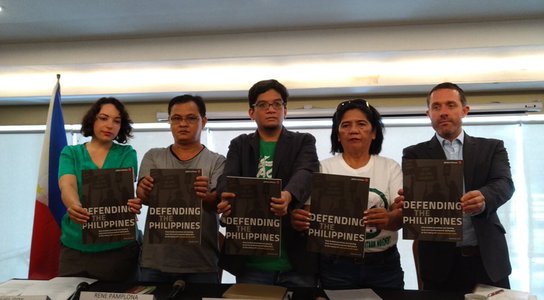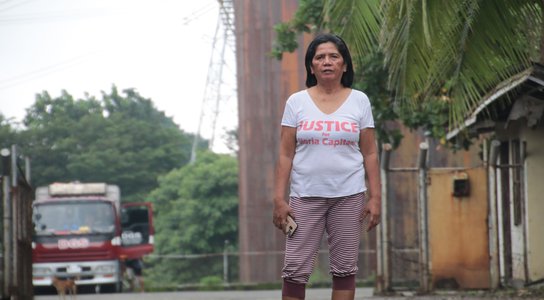For most of us, government ‘lockdowns’ are an extraordinary reality of the COVID-19 pandemic. But for land and environmental defenders already facing threats, fear is rife that the crisis could be manipulated to put them at even greater risk. Six months on from publication of ‘Defending the Philippines’, we take a look at what has changed for defenders in the country – and what threats remain.
“Shoot them dead” is the order that President Rodrigo Duterte delivered recently to Filipino law enforcement and the military regarding their response to anyone found to be breaking the COVID-quarantine.
This is not the first time that Filipinos have heard the government’s aggressive rhetoric and feared the consequences. Last year, our report showed how officials branded protesting communities as “terrorists”, activist grandmothers as “economic saboteurs” and environmentalists as “narcos”. The criminalisation of land and environmental defenders is part of a long list of tactics, used by governments and companies to deter activism.
Not only that, our investigation showed how household brands such as Del Monte Philippines and Dole Philippines, and international investors like the International Finance Corporation (IFC), failed in their due-diligence – backing projects opposed by local communities and connected to the intimidation or murder of land and environmental defenders.
Despite President Duterte’s promises to tackle corruption, combat environmental harm, and protect indigenous peoples, it is ordinary Filipinos who are ‘Defending the Philippines’, protecting their land, health and livelihoods from corporate greed and vested interests.
But what is being done to support them?
FILIPINO LEGISLATORS START TO TAKE ACTION
Two months after the launch of our investigation, legislators filed a resolution in the Philippines Congress calling for an independent investigation into the ‘staggering number of killings’ of land and environmental defenders in the country, and demanding accountability.
This includes scrutiny over whether investors and companies have abided by national laws that uphold international standards. It includes addressing claims of corruption within the National Commission of Indigenous People, whose responsibility is to protect indigenous communities. And it includes scrutiny of the role of the military and paramilitary groups, accused of using excessive violence to guard mines and plantations.
The resolution could not be timelier. Our report documented at least 113 murdered defenders in the first three years of Duterte’s government – over half allegedly by the army or paramilitary. Six months on, an initial analysis of Global Witness’ 2019 data suggests that the overall number may be even higher. – And ‘activists’ are not the only people being targeted. Last year saw a growing number of attacks on government officials employed to protect some of the Philippines most iconic environmental landscapes.
BIG CORPORATES LEAD ON BUSINESS AND HUMAN RIGHTS
In recent statements, Del Monte Philippines, Dole Philippines and the International Finance Corporation (IFC) outlined positive action taken on the back of our report.
The agribusiness companies acknowledged the need for clear and concrete internal policies to address the issue of reprisals against those speaking out about their projects. Dole Philippines announced that the company has “undertaken a review of its internal processes to better ensure that it shall not be a party to… violence against environmental defenders and/or indigenous people”, and committed to “outlining more concrete company policies”.
Del Monte Philippines have gone a step further, engaging with civil society organisations as they review their “impact assessment and due diligence processes”, while “identifying areas of no compromise or zero tolerance.” The company committed to “preventing and responding to any reprisals against persons who voice out issues about any of the businesses our company is involved in,” and to translating these commitments “into concrete action steps.”
Across the sea, the IFC confirmed that, following its 2018 Position Statement on Non-Retaliation, the lender is “developing internal protocols and guidance for staff on reprisals screening, prevention, and response”. In December, the IFC launched a new “contextual risk tool” which will be included as part of due diligence processes across all investments. The IFC told Global Witness that the tool includes a “reprisals-specific dimension… to screen for project contexts with high risks of retaliation and violence”.
They also announced the creation of a “Stakeholder Grievance Response team” reporting directly to the CEO, and committed to bring forward new guidance on “stakeholder engagement practices” and to “engage with its clients or other appropriate parties” when reprisals allegations are raised.
The challenge for all three business actors now is to use the next six-months to turn intent into action, including by:
- Ensuring transparent consultations with a diverse range of civil society.
Companies should ensure consultation with stakeholders throughout policy development and project implementation. Though Del Monte Philippines acknowledged that this may not be “without some discomfort”, it is an obligation of business to engage stakeholders, as set out in the UN Guiding Principles. Both Del Monte Philippines and the IFC have taken positive steps in this respect. However, a crucial part of any responsible business model is opening the door to robust and transparent consultations with communities and a diverse range of civil society experts from the Global South and North. Investors and financiers should also take a closer look - see here for Responsible Sourcing, our investor due diligence briefing, which outlines material risks and actions for investors to take under increasing scrutiny around human rights.
- Reporting publically on the implementation of new policies throughout their operations.
Human rights and environmental policies can only be judged by their implementation. As such, it is important that the results of pilot policies are shared, and that these companies follow through on their commitments, with both strong public statements supporting defenders and condemning reprisals, and transparent reporting on the practical mechanisms being put in place to avoid abuses.
- Providing redress for the victims of any abuses and environmental harms associated with their operations.
Affected communities continue to seek redress for human rights abuses and environmental harms connected to business projects. Rather than remedy, many find only increased harassment.
In Bataan, for example, communities continue to face threats in their struggle against coal-fired projects like the Limay coal plant, controlled by San Miguel Corporation. Both San Miguel and investors like the Mizuho Bank, Standard Chartered and the IFC have failed to make reparations to those impacted by environmental damage and displaced by the project.
Even more concerning are community fears that the Philippines reliance on coal-fired power could lead to the expansion of projects in the region. According to government statistics from February 2019, coal-fired power makes up all 80% of production on the island of Luzon. Almost 50% of coal production occurs in the province of Bataan.
FROM BAD TO WORSE – COVID-19 AND NEW THREATS OF CRIMINALISATION
Critics fear that the current public health crisis might be used to further clampdown on activism, with few safeguards to prevent the misuse of emergency measures.
As I write, civil society report on armed police misusing these powers to arrest Rolando Pulido for preventing access to a controversial mining operation, which locals claim is contaminating their local water supply in Didipio.
It has been widely reported that the mining licence expired in June 2019, but project opponents say operations continue. It appears that the Office of the President has overruled the provincial government to allow this to happen. Activists point out that the company is flouting the quarantine order, leaving locals with little choice but return to the barricade to protest, albeit respecting social distancing.
This heightens fears that legislative changes may be used to criminalise rights activists. In February, the Senate approved anti-terrorist legislation aimed to prevent collusion and financing of terrorist activities. The bill stoked controversy and mistrust amongst civil society groups, who fear it could be used as a smear tactic by officials and state forces to target critics.
Indeed, the government used a recent session of the UN Human Rights Council, to vilify the ‘hallowed status of human rights defenders’ and accuse civil society groups of supporting terrorists and acting as communist fronts. This is not a government which civil society trusts with emergency measures. In this context of extended powers, restricted scrutiny and smear campaigns, defenders will need more support than ever.
WHAT MORE NEEDS TO BE DONE?
- Legitimisation of defenders, and the passing the Human Rights Defender Bill
Now, more than ever, action by the state to recognise and protect defenders must not stall. In an unprecedented move, the House of Representatives unanimously approved a Human Rights Defender Bill last June. However, the Bill will only enter into force if it is also passed by the Senate and approved by the President.
The development came shortly after the United Nations Human Rights Council approved a resolution sponsored by Iceland to launch an independent investigation into human rights violations within the country – including abuses against environmental activists. Due for publication in June 2020, the Philippines government should work with UN experts and civil society stakeholders to act upon the report’s findings.
- Justice for the victims and their families
There must be justice for Renato Anglao, Ruben Arzarga, Jimmy Saypan and Gloria Capitan. These are emblematic cases that the Filipino government must prosecute to send a message to other would-be assassins of land and environmental defenders.
In several meetings with Global Witness, the Department of Justice (DOJ) championed Administrative Order 35 - a measure that empowers them to create a specific Prosecutor-led task force to investigate the defenders’ advocacy as the potential motive for their murder. This approach is a must if any investigations of threats against defenders are to be successful.
In all four cases of murdered defenders featured in our report, the victim had reportedly received threats before they were killed. In most cases, they had directly alerted authorities at the time.
Yet six months on, and in spite of the additional evidence in our report and meetings with both Global Witness and defenders, the Department has failed to move any of these cases forward. It seems the burden is on the victims to investigate and prompt the DoJ, in the hope they might act.
- Creative action by diplomats.
Activists have urged diplomats to take creative action to support at-risk defenders. Existing human rights defender policies, like the guidelines published by the EU, UK and US, mandate embassies to take a creative range of public and private actions to monitor the threats facing activists, support them directly, and advocate for their protection. Effective diplomatic action would also mean ensuring that companies and investors implement responsible business practices.
Defenders have reported positive actions by some embassies in the past six months. In light of the ongoing threats, international support for those at risk is more crucial than ever. But in the context of the pandemic, diplomats are going to have carry out their duty to defenders creatively, if they are to carry it out successfully.
With communities remaining in lock-down in the near future, defenders are facing greater pressures. It is more vital than ever that existing promises and international obligations are upheld by business, government and the international community. So long as good faith is shown, Global Witness will keep working with these stakeholders to ensure that defenders’ voices are heard, their rights protected and the root causes behind their activism are resolved.
Responses from Del Monte Philippines, Dole Philippines and the International Finance Corporation can be read in full here.
Global Witness offered companies we met with following the launch of our investigation, ‘Defending the Philippines’ for updates on the actions taken to support and protect defenders in the six months since our report launch.
Their responses:
DEL MONTE PHILIPPINES INC
“Global Witness’ campaign late last year made clear to us how there could be a huge disconnect between how we see our company and how some sectors interpret our actions. One of our affiliates’ watchwords is our being “Growers of Good.” Being one of the good guys entails an organizational mindfulness and focus on enduring principles such as respect for human rights which we had always thought our company would never have issues on. The growth of our business, our evolving supply chain and the expanding reach of our operations require increased vigilance to ensure that the lives our businesses cross paths with are indeed enriched as stated in our company vision: Nourishing Families and Enriching Lives. Such vigilance needs to be articulated in a very clear policy, translated into concrete action steps within our company’s existing business processes and ingrained in our culture.
Hence, we had embarked on a journey of reflecting on our beliefs as to who we are and what we stand for, including identifying areas of no compromise or zero tolerance. We are motivated as well by the prospect of our employees, customers, investors and business partners being very satisfied with our company’s human rights track record and sustainability practices. We had taken pride in our practices as being in step with those of other responsible corporate citizens. However, we now take the challenge of reviewing our impact assessment and due diligence processes including areas of focus and monitoring frequency. It is true that we had internally reviewed these and made some changes, but beyond doing these by ourselves and with our existing lens, we have engaged (not without some discomfort as in any learning experience) with civil society and human rights experts and advocates. We want to be proactive, to the extent that we can, in preventing and responding to any reprisals against persons who voice out issues about any of the businesses our company is involved in. If all these mean that we would lead the way on business and human rights in the Philippines, then we will carry on.”
DOLE PHILIPPINES
“Even prior to the current COVID-19 pandemic, Dole Philippines, Inc. was already in the midst of re-examining its company purpose and the core principles that guide it in the operation of its business. Such rethinking of its purpose as a producer of healthy food products is in line with Dole’s goal of being more attune with the needs of its surrounding community and stakeholders.
Dole shall continue to be guided by its own Code of Conduct and shall adhere to the highest ethical standards and operate its business openly and honestly within the spirit and letter of existing laws.
Dole is committed to following the UN Guiding Principles on Business & Human Rights. As a socially-responsible corporate citizen, Dole fully respects the fundamental and internationally-recognized human rights. Dole looks forward to outlining more concrete company policies and programs in support of the UN Guiding Principles.
With respect specifically to violence perpetrated against environmental defenders as alleged in Global Witness’ “Enemies of the State” report, Dole has undertaken a review of its internal processes to better ensure that it shall not be a party to any such reprisals or violence against environmental defenders and/or indigenous peoples. Additionally, it has implemented a regular dialogue among its employees who are members of indigenous groups to ensure that concerns from indigenous groups are constantly discussed with company representatives.”
THE INTERNATIONAL FINANCE CORPORATION (IFC)
“Since releasing its public Position Statement on Non-Retaliation in October 2018, IFC has been tracking reprisals allegations more systematically and developing internal protocols and guidance for staff on reprisals screening, prevention, and response. In December 2019, IFC launched a new contextual risk tool to be included as part of IFC’s Environmental and Social due diligence processes for all investments. In recognizing the importance of early prevention, a reprisals-specific dimension has been added to screen for project contexts with high risks of retaliation and violence. New guidance is also forthcoming on adapting stakeholder engagement practices and client grievance mechanisms in these situations, including in the rapidly emerging Covid-19 context.
When reprisal allegations are raised, IFC works within the scope of its role as a lender and investor to engage with its clients or other appropriate parties, make its position against reprisals clear, and take follow up action as and where needed. These efforts are being strengthened through the creation of a dedicated Stakeholder Grievance Response team, established in July 2019 as part of IFC’s new Environment & Social Policy and Risk Department – which reports directly to IFC’s CEO. This team and department are working to raise awareness and provide guidance to operational teams regarding retaliation risks and threats, with a focus on early prevention and engagement efforts.
We look forward to continued engagement and collaboration with Global Witness and other key stakeholders on this important and challenging topic.”


